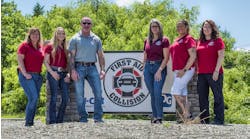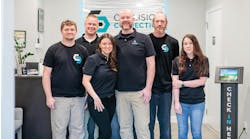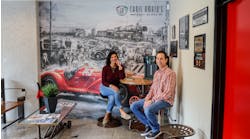Account work generates solid growth for family-operated shop in California
According to an old fashioned adage, it's just as easy to marry a rich man as a poor man. And while that particular saying may be politically incorrect today, its logic often applies to other things.
In the collision repair business, for example, some shops have found that it's just as easy to land a big account as a small one — and that such a strategy can yield big returns over a period of years.
When Kris Wyatt took over management of his family's body shop in San Bernardino, Calif., in 1998, he made the decision to pursue work from car dealerships, companies that had fleets of vehicles and manufacturers whose new cars sometimes suffer damage during the delivery process. Today, the shop, Wyatt's Paint & Body, gets a substantial part of its business from such customers, which Wyatt refers to as "account work."Wyatt's mother Debbie, who owned and managed the shop from its opening in 1973 until 1998, had built the business up to a level of $440,000 in annual sales. "My goal was within five years I wanted to gross $1 million," says Kris. "I did it in six years — and in the seventh year, I cleared $2 million. We're running around $2.25 million now and it's been nine years."
Much of that growth came from account work and from direct repair work, which Kris also sought out. When people have an accident, they call one of two people, notes Kris — their previous body shop if they've had accidents before and were happy with the work — or their insurance company. "The insurance companies have all the money," says Kris. "If you're going to stay alive in this business, you're going to have to get on board with the insurance companies."
To help get the DRP work and business accounts, Kris prepared a profile of Wyatt's Paint & Body that described its history and capabilities, which he sent to target prospects. Although that approach didn't work with all the major insurance companies, the net results were positive. The company is now on three DRPs, which generate about 50 percent of the company's business.Kris also succeeds by keeping a sharp eye out for companies that could benefit from his services. When he sees a business with wrecked vehicles on the premises, he says, "I go in and start talking."
Providing good service to business accounts also helps generate new accounts. Wyatt's Paint & Body got into repairing cars for manufacturers through a referral from a dealership that the shop already was servicing. The manufacturer also liked the fact that Wyatt's Paint & Body is near a major train line — and that Kris's brother owns a towing company, facilitating delivery of vehicles to and from the shop.
The margins on account work aren't as high as on other jobs, including insurance work. But such work is more profitable for Wyatt's than for some other shops because the company has very low overhead. Kris doesn't like to borrow money, preferring instead to plan and budget for any major expenses. When the shop needs some major equipment, Kris prefers to shop around and find it used, rather than buying it new.
The company also gets a substantial amount of business from individual car owners, some of whom are the grandchildren of original Wyatt's customers. Debbie Wyatt, who still works in the shop, offers a reminder of the company's years of service to the community through a photo wall of past and present customers that she maintains in the shop.
If a car needs mechanical work as a result of a collision, Wyatt's has technicians who can handle it. "The advantage of doing our own mechanical work is time," notes Kris. "You can get the repair done faster and we make money in-house."Although Wyatt's Paint & Body is still in its original location, it has expanded several times over the years. Situated on a two-acre site, the company started with just a single building and now has five.
With sales running in the range of $180,000 to $220,000 a month, Kris is wary of reports from other shops about the difficulty of maintaining profit margins when sales climb to the $300,000 a month range. Such shops say profitability improves when sales climb again to the $400,000 range. But hoping to avoid a potential pitfall, Kris is watching margins tightly and pursuing a strategy of controlled growth. His goal, he says, "is to grow the business by making cars easier to work on and getting the work done faster."
To achieve that, he views the repair process as a continuous learning process. "Every day we change how we bring cars in and tear them down," he says.




